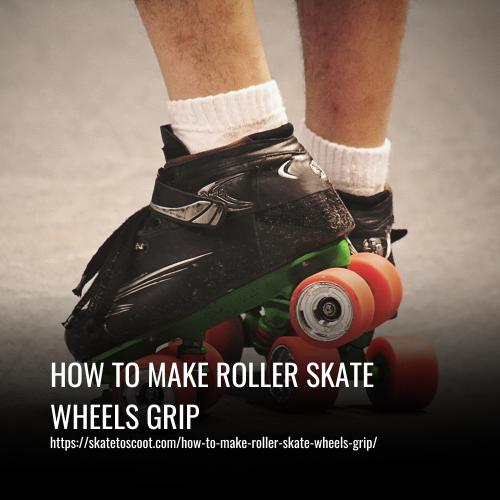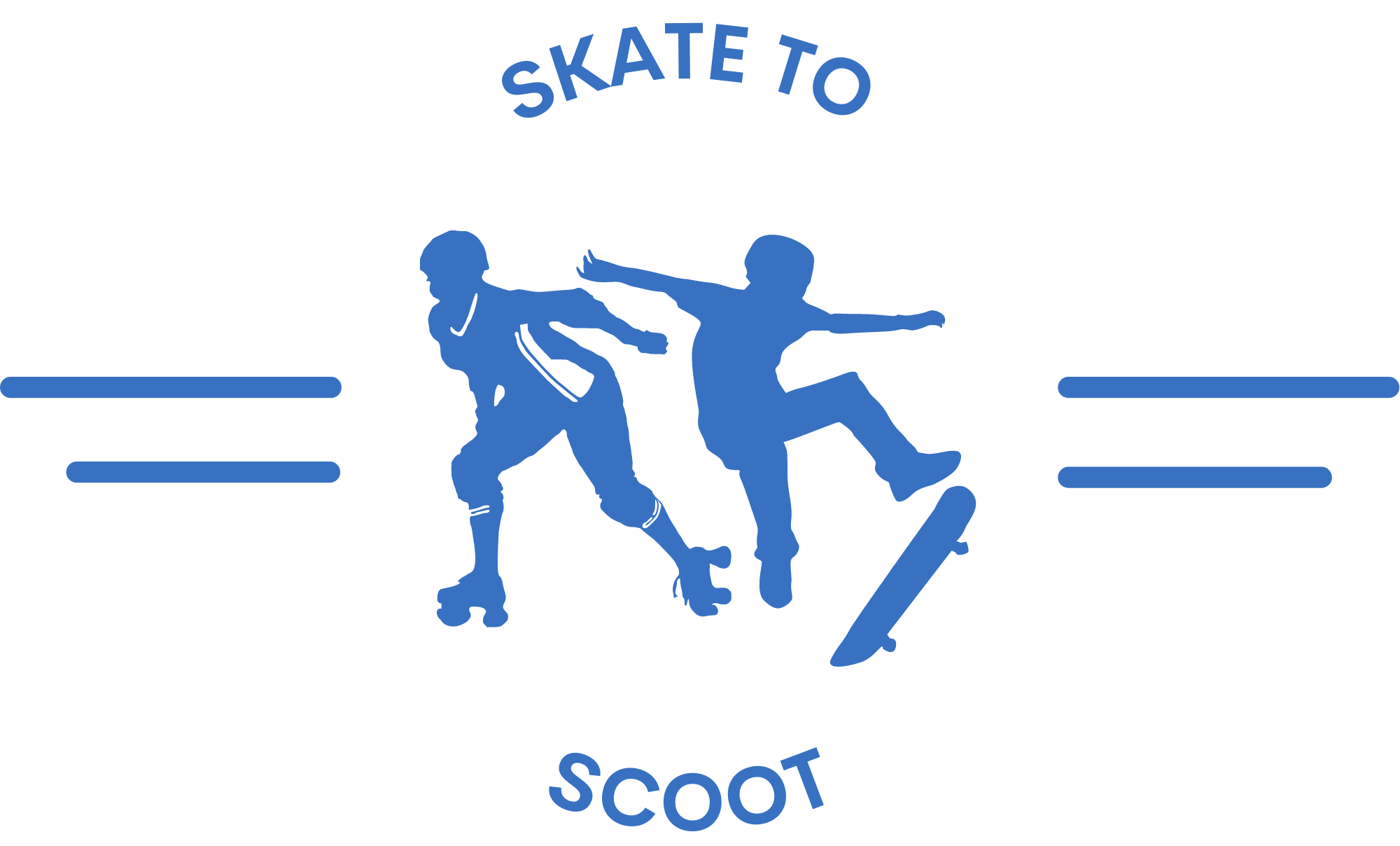How To Make Roller Skate Wheels Grip
As an Amazon Associate we earn from qualifying purchases.
To Make Roller Skate Wheels Grip, follow these steps:
- Choose the Right Wheels.
- Clean Your Wheels.
- Use a Wheel Grip Spray.
- Change Your Wheels Regularly.

How To Make Roller Skate Wheels Grip Better?
Making your roller skate wheels grip better is an important part of improving your skating performance. Here are some tips to help you get the most out of your wheels:
Choose the Right Wheels:
The type of wheel you choose will have a big impact on how much grip it has. Generally speaking, harder wheels are better for grip than softer wheels. Harder wheels are also more durable and last longer than softer wheels.
Clean Your Wheels:
Dirt and debris can build up on your wheels over time, reducing their grip. To keep your wheels in top condition, make sure to clean them regularly with a damp cloth or brush.
Use a Wheel Grip Spray:
If you want to give your wheels an extra boost of grip, consider using a wheel grip spray. These sprays are designed to increase the amount of traction that your wheels have on the skating surface.
Change Your Wheels Regularly:
Over time, your wheels will wear down and lose their grip. To keep your wheels in top condition, make sure to change them regularly. This will ensure that you always have the best possible grip while skating.
What Can You Do To Make Roller Skate Wheels Grip?
Slippery roller skates can be a real challenge, especially on a slippery skating surface like a wooden floor or tiled surface. Luckily, there are ways to make the wheels on your skate grip better.
One way is to change the size or diameter of your wheels. This will help you gain better control over your skates without making them too slippery. You can also prevent slipping by replacing your wheels and bearings. You should also practice balancing in order to increase grip, as well as avoid wet surfaces which can make any kind of skate even more slippery.
All these steps should help you get the best results from your roller skates!
Replacing Wheels
If you want to make sure that your roller skate wheels have the best grip possible, you’ll need to replace them from time to time. When looking for replacement wheels, it is important to pay attention to their size and diameter. You should always double-check if your wheel nuts are too tight or loose and adjust them accordingly.
For non-slippery skating, 84A to 85A scaled wheels are the ideal size. Additionally, your skating performance will vary depending on the size of your wheels, so it is important to choose the right ones if you’re just starting out. Lastly, ensure that both shoes are worn evenly – when one shoe is too tight while the other is too loose, it can be difficult to balance while skating.
Practicing Grip Balancing
When it comes to gaining confidence in skates, practice is the key. It takes hard work and dedication to learn how to properly balance your grip with roller skate wheels.
At first, you might feel a bit lost while attempting to start up your skating journey; however, if you keep going slowly and with consistent effort, you should become more familiar with your wheels in a shorter period of time. Once you master your grip balancing technique, you’ll be able to skate both indoors and outdoors with ease!
Don’t give up! With enough practice and persistence, you will get the hang of grip balancing for roller skate wheels. Be sure to seek out the right kind of wheels as well so that you have maximum control no matter what surface or terrain you’re skating on.
Trying Out Different Surfaces
Gripping new surfaces is key to making sure you get the most out of your roller skate wheels. Trying different outdoor surfaces can be a real challenge and reward – challenge yourself by trying out an asphalt surface or even a wooden one and see how much progress you can make! You can do this suddenly, anywhere you go, so why not give it a try?
It’s all about pushing yourself every time. Each new surface will bring different levels of grip as well as other interesting features that may help you gain control over your wheels faster than before. So don’t be afraid to try something unfamiliar – only then will you really experience the true speed of roller skating.
How Can You Tell If Your Roller Skates Are Too Slippery?
If you’re using your roller skates and find that they’re slipping backward or forward, you may have a case of slippery skates on your hands. A sure way to tell if your wheels are too loose is to check the nuts under the wheels. When these are loose, it can make them extra slippery.
When you first buy your skates, it is normal for them to not completely grip the surface yet. You need to go through a few days of skating and practice in order for them to feel just right. However, if after this period of time, they still feel too slick, take a closer look at your wheels and make sure everything is tightened properly.
Safely tightening everything up will reduce their slipperiness and increase control while you’re on the rink.
Why Should You Avoid Slippery Roller Skate Wheels?
If you’re serious about roller skating, it’s important to make sure you avoid slippery wheeled skates. There are a few reasons why this is important.
Firstly, if your skates don’t have the right grip and traction, they can easily slip on certain surfaces which means there’s a higher risk of you falling over.
Secondly, when skating on wet or slippery surfaces can be dangerous—you could very easily lose control and skate into something or someone else.
Finally, the added grip from non-slippery wheels ensures that your wheels turn in the intended direction and makes braking easier.
So if you want to stay safe while roller skating, always avoids slippery wheeled skates!
Slippery Skates
Slippery skates with wheels of poor quality should be avoided. It can be difficult to roller skate comfortably if you have the wrong-sized skates, or if the wheels are too small or too large. Wearing an oversized or undersized pair of skating shoes can also cause difficulty, as it increases the chance of slipping while skating.
This could lead to damage to your toes over time, so it’s best not to make a habit of wearing the wrong-sized shoes when you skate. In addition, slippery skates with low-quality wheels will make roller skating particularly difficult, and increase the chances that you may slip and fall while skating.
Slippery Surface
Roller skaters should always be aware of the potential danger that a slippery surface can present. Even when it’s not raining, it’s possible for the ground to become slick and dangerous.
Generally, if something wet has touched these surfaces and there is no time to dry them out before skating, they should be avoided. This is especially true when it rains as the surface is already wet, making it especially slippery.
Skating in the rain can be very risky due to the slippery terrain, rapid speed, and lack of control over where you may end up going. It’s too much of a risk for most people so it’s best to avoid skating on a rainy day at all costs. If you’re looking for some thrills, try skating on a sunny day instead!
FAQs
To enhance grip on various surfaces, consider adjusting the hardness of your wheels. Softer wheels offer better grip on slick or rough surfaces like concrete or asphalt, while harder wheels are suitable for smoother surfaces like wooden floors. Experimenting with different wheel durometers can help you find the right balance between grip and speed.
Yes, maintaining and cleaning your current wheels can significantly enhance grip. Wipe them down regularly to remove dirt and debris. Additionally, rotating the wheels periodically ensures even wear, maximizing their grip potential.
Leaning forward slightly and distributing your weight evenly across all wheels can improve grip. Bend your knees to increase stability and maintain better control over the wheels, allowing them to better grip the surface.
Adjusting truck tightness can affect grip. Tightening the trucks increases stability but might reduce maneuverability, while loosening them enhances maneuverability but might compromise stability. Find a balance that suits your skating style for optimal grip.
Yes, wheel shapes and profiles impact grip. Wider wheels with squared edges provide more surface area, offering increased contact and better grip. However, the trade-off might be reduced agility compared to narrower, rounded wheels.
While bearings mainly affect speed and smoothness, higher-quality bearings can contribute to better overall performance, indirectly influencing grip. Opting for well-maintained bearings reduces resistance, allowing wheels to maintain better traction on surfaces.
Conclusion:
Overall, making roller skate wheels grip can be quite a challenge if you’re not sure what you’re doing. Take your time to adjust the tightness of the wheels, choose the right type of bearing and find suitable lube, as this will help significantly with grip and ease of turning. With some patience and practice, your skates will take you places in no time!
